- Home
- Adam Thorpe
No Telling Page 12
No Telling Read online
Page 12
‘We’ve both lost a sister before we were born, then.’
I’d already told him about Nathalie.
‘Yeah. That’s weird.’
‘My uncle takes Le Figaro,’ I said. ‘I tried to ask God for a sign, when I asked about Nicolas, but I don’t think I got one.’
‘Eh?’
‘I’m not sure if it was or not.’
‘What?’
‘A sign from God,’ I said.
‘What’re you on about, mate?’
I told him about the man in the homburg hat walking twice past the showroom window, looking as if he’d lost something. Christophe rubbed his forehead, making his quiff tremble.
‘Bad news. They’ve invaded,’ he said.
‘Who?’
‘The men from Planet X.’
‘Shut up.’
‘I’m the only one who knows it. No one wants to believe me.’
Christophe was looking at me with his hands spread, as if deadly serious. The polystyrene bits were caught in my sleeves; I picked at them but they were stuck in the wool’s hairs.
‘OK, how do you recognise them?’ I asked.
‘Hats like your bloke’s. Little moustache. Did he have cheeks that were eaten away a bit, like that plank over there?’
‘Yeah.’
‘Shit.’
‘What do they want?’
‘They want to destroy the world. They take over your mind and make you think you’re who you are when really you’re one of them.’
I thought, with a little rush of fear, of Nicolas: his blank look, his weirdness. We were scaring each other, sitting there by the looming old military hospital. It was very quiet, apart from a sort of humming mixture of traffic and factories and the usual shouts and crashes and things. But you didn’t hear that after a while.
‘Cross yourself before you go to sleep,’ Christophe said, looking around us. ‘And hang some garlic around your neck. Just in case.’
‘That’s for the Devil.’
‘They’re in league with the Devil,’ Christophe pointed out, frowning at his feet, his eyes shifting about.
‘Nicolas,’ I murmured.
‘What?’
‘Doesn’t matter.’
‘Shit,’ muttered Christophe, ‘maybe you’re one of them already.’
I widened my eyes in a mad, staring way. It was frighteningly enjoyable, not being myself.
‘Nah, they never look mad,’ Christophe said. ‘They look totally normal. The only thing is, they smell of shit.’
‘And they make really boring speeches about strikes and things.’
‘Yeah. What’s that smell?’
‘What smell?’
‘That shit smell,’ Christophe whispered.
He sniffed the air.
All I could smell, in fact, was the resin from the pines, which was one of the reasons I came here. It was my favourite smell, only slightly spoilt by the sour whiffs from the aluminium factory’s thin chimneys which poked up over the roofs beyond the wall. He started to sniff in my direction, leaning towards me and snuffling at my shoulder. I leapt to my feet and ran off around the grounds. Christophe chased me, yelling. He caught up with me and we wrestled together in the soft ground, the pine-needles sticking to our cardigans and pricking our palms.
‘You’re already taken over,’ I panted, ‘it’s too late.’
‘Yeah, I am – and my orders are to kill, kill, kill.’
I pretended to die horribly as he pinned my arms and dropped a gob of saliva on my face.
We tried to make a go-cart from the invalid chair, still pretending to be aliens, talking slightly robotically until it got boring.
‘Why did you want a sign, anyway?’ Christophe asked.
‘To know if Nicolas had been done away with.’
‘That’s funny, my dad said he’d got some nice tender sirloin in last week, as tender as a baby’s bum.’
He said it as if he meant it, trying to put a plank between the big, rusted wheels of the invalid chair. I could smell, in my mind, the thick sickly smell of red meat and blood in his dad’s shop. I realised that no one else cared about Nicolas. He was a cretin, that’s why. A medical cretin, not an alien. I felt a great love for him come up in me, stronger than anything I had felt while he was in the house. I held the plank while Christophe tied it to the seat, passing the string between the broken cane bottom.
‘What we need,’ said Christophe, ‘is a little wheel in front, turning on a pivot. So we can steer it.’
I pictured the invalid chair whirling between the trees, going round and round and round. Once we’d got the main wheels to move. They didn’t move; they were rusted tight. We dug around in the heap of junk lying against the prefabricated wing for some more wheels and found what we at first thought was the bucket of a pram. It turned out, on being brushed free of dirt and cobwebs, to be an old side-car with the number 49 in white on the front and a German nameplate inside it.
It didn’t have its wheel, but we could sit inside it one at a time and move along by rocking. Christophe told me that he’d heard the place had been used as a Gestapo headquarters, and that people had been tortured here.
‘With boiling water and stuff? That’s what happened to missionaries. They had to drink boiling water—’
‘Everything,’ he said, quietly, as if he’d seen it.
6
My sister’s hospital was a long, concrete building of about ten floors. It had narrow windows running around it in stripes, like an office block; from the inside, these windows turned out to be large. From the top floor (where the mental ward was) you could see a long way over other flat roofs to low hills covered in woods. It was attached to another building a bit like the old military hospital, full of more departments with long frightening names.
It was a long drive to get there. The hospital was halfway round Paris, in Nanterre, and was called Foch. I wondered why she couldn’t have been placed somewhere nearer. The car twisted and turned through lots of suburbs as if Carole was at the centre of a maze. Only my uncle knew the way in and the way out, it seemed.
We visited Foch on Sunday afternoons, so the streets were mostly empty and it always seemed to be bad weather. Sunday afternoons were good because she’d got over her treatment by then, which didn’t happen on weekends. The empty boulevards were shiny with rain, their cafés’ metal shutters drawn down. The blocks of flats were not nearly as good as my realistic Lego versions, and they made the brick houses look even tinier and weaker. In the middle of all this muddle my sister lay, being healed by an invisible army of experts in white coats. They said it was very important for her to see us regularly.
The ward was long and full of people who either slept with their mouths open or behaved strangely. I was told not to think of them as mad but as having problems with their nerves. They chatted away to themselves, or gave tiny shrieks not much louder than the squeaks of the beds, or carried out busy little actions that were repeated over and over. I only realised after two or three visits that they were all women.
The woman next to Carole heard ‘voices’, which interested me a lot. She appeared to be very old, with a sunken mouth and messy white hair; this was because her false teeth had been taken away from her and she refused to have her hair combed. In fact, she was only forty-two and was called Einstein because Einstein never combed his hair, either.
Carole told us this. She was the most ‘normal’ person there, we thought, as well as being the youngest. She seemed very jolly, looking about her at the others as if they were part of some kind of entertainment – a circus, or a comedy programme on television. She never asked about Nicolas. We did have sensible conversations, though, apart from what my mother called ‘hiccups’.
I hated these visits, in fact. The ward’s noises reminded me of the tropical bird cages in the Jardin des Plantes – their whistles and whoops and mutterings. I pictured Carole with ridiculous, brightly coloured feathers around her face, nodding and cocking her head on
one side like a cockatoo. My mother always told me, afterwards, that I’d been staring at Carole too much. People with nervous problems didn’t like to be stared at. It made me tired, talking to Carole as if there was nothing odd about the situation: on the way home I would cry silently in the back of the car as my uncle and mother bickered (this bickering always took place after a visit, so perhaps it made them tired, too). My mother had bought a shiny black wig which was attached by a wide hairband to her greying hair; the wig fell in a fashionable, thick curl over her ears. She would always wear it on these visits, perhaps to separate herself even more from the patients with their messy hair or shaven heads. The trouble is, it made her look false in some way.
One day (the last visit before Christmas, in fact), I speed-walked into the ward ahead of my parents. I wanted to see Carole without them, even if only for a few moments. We couldn’t really talk together when they were there. I was holding a box of chocolates; we always brought her chocolates.
I stopped dead in my tracks. The double-doors with their little portholes swung shut behind me: bump ump ump.
Almost all the patients in the ward were looking at her.
She was in the nude, without even a slip, right in the middle of the ward. I had never seen her completely in the nude. A nurse by the doors hadn’t yet noticed, she was facing the wrong way, talking to an older woman in a smart coat. The woman was saying, ‘He isn’t that much of a reader, that’s the trouble,’ and the nurse was nodding, her hand on a trolley full of plastic and metal hospital things. Past her face I could see Carole wobbling as she lifted up her bare leg higher and higher to the side, keeping it very straight. Then she dropped it and jumped with her arms in the air and landed on her toes with a bump. She turned around with funny little movements of her feet, like a doll on a music-box, and then bent down as if to pick something up and stretched one leg right out behind her with her arms spread wide like a jet fighter and her face almost touching the lino and then came back up again and spun round on one foot and ended up with her back to me and started leaping all the way along the aisle between the beds, magically, as if the floor was a trampoline. Her white bottom was bouncing a bit. The nurse and the other woman went out pushing the trolley. They hadn’t even noticed.
Now Carole was turning very slowly in the position of the dancer in the smoke on my mother’s Gitanes packets, one hand in front of her as though holding a baby, the other one above her head.
The patients were clapping and making comments. One or two cheered while some of them just looked on silently with their mouths open. A few weren’t looking at all, as if this happened every day. Carole was panting in the overheated room; I could see the sweat glistening on her forehead and running down between her bare bosoms in big drops that reflected the striplights. Her bosoms almost disappeared when she stretched her arms out, and then the next minute they came back quite plump.
The doors behind me squeaked and went bump ump ump again.
A gasp I recognised as my mother’s. A whiff of Brut after-shave. I didn’t turn round. I couldn’t. Someone had frozen me.
Carole was staying still for a moment, her arms down by her side, looking up at the ceiling. There was a hairy patch between her legs that looked stuck on; it was very dark. As long as I didn’t turn round and see my mother and uncle, I wouldn’t be embarrassed.
A couple of visitors, a man and a woman, sat in their coats by the nearest bed. They looked very uncomfortable, their eyes shifting about, the woman fiddling with the clasp of her handbag. I heard the doors go bump ump ump again and knew that my uncle had left. It made me feel better.
I turned my head round, just to check. My mother was twisting her gloves in her hands. Our eyes met but I stayed as blank as I could. My sister’s ribs were showing, now: she had lifted her arms up to the ceiling, her hands making little movements like flames and crossing at the wrists. Then she walked slowly down the ward towards us as if on a tightrope, one foot directly in front of the other but bent to the side, her arms stretched right out, staring in front of her and smiling.
She looked beautiful, despite her messy hair. It fell in front of her pale face and made her look a bit wild, although her walking was very careful and controlled. I had never seen the points on her bosoms, or not so clearly: they were not as I had imagined them, they made me think of the decaying carnations left over from All Saints’ Day in the cemetery. Now she had gone up on her toes and was tip-tapping quickly along the aisle like some sort of bird, her bosoms jiggling up and down and making her look silly. I felt like shrinking to nothing as she approached, but she hadn’t seen us yet.
‘Oh, Carole,’ my mother murmured. ‘Oh, my little girl.’
My mother was in tears, I could hear that. My sister twirled on the spot and then tip-tapped forward again so close I could smell her overheated body just as the door opened and two orderlies in white coats entered, my uncle and a nurse behind them. Carole stopped, staying up on her toes as the orderlies came either side of her and fumbled with her arms, their hands slipping off as if her flesh was too wet. Then she fainted, but on purpose – laughing as she did so, going completely limp so that they had to hold her arms tightly, struggling to keep their own balance. The hairy patch didn’t fall off. She was taken back to bed like that, a nightdress pulled down over her head to make her decent. Her body was so limp she might have been dead. But no, I could hear her giggling to herself all the time. It was as if the two orderlies were tickling her. One had large dirty teeth and the other looked too thin, with curving sideburns.
We waited a minute or so and then found ourselves sitting down around the bed.
‘That was nice,’ said my mother, her voice clogged up with tearfulness. ‘A very nice dance, dear.’
Carole kept her eyes closed, teasing us with her little sniggers and snorts; I fancied she was watching a TV comedy programme scientifically beamed into her brain. That’s how it’ll be by the year 2000, I thought. There’ll be nobody mad by then – you’ll just have to take a little pill like an astronaut takes his dry meal. My uncle’s face was squashed against his hand as he leaned forward.
My sister refused to open her eyes, and after a while she fell asleep. Apparently the nurse had injected her with something to send her off, but I hadn’t noticed.
While she was asleep, my mother and uncle made the usual comments about my sister’s state. I was sure she was listening to them in her dreams. ‘Einstein’, in the bed next to hers, was swivelling her eyeballs as far as she could: up, down, left, right, in a strict pattern. It was catching: I could feel myself wanting to do the same. I started to copy her, trying to predict where her eyeballs would go to next. Suddenly my wrist was sharply tapped.
‘Stop doing that, Gilles,’ my mother hissed. ‘It’s very rude to mock.’
‘I wasn’t, Maman.’
I wanted to fling myself about and shout, but couldn’t.
‘I don’t know why you had to stay watching, Gilles,’ she said, almost under her breath.
We left earlier than usual, leaving the Christmas gifts with the nurse. My mother was cross and upset, as if she wanted to tap everybody else’s wrist, too. She talked for quite a while with the nurse while my uncle and I waited further along in the corridor. There were paintings in the corridor, done by patients, and my uncle said that this was the modern method of making people better. One was of a black house with black stick-people flying out of it like crows; I could hardly look at it. In the past, he told me, mad folk had been kept in terrible conditions, behind bars or in cages, while perfectly civilised people laughed at them.
‘Like the zoo,’ I suggested.
My uncle was tapping his pipe into the red fire bucket. It had FOCH painted on it in stencilled yellow letters, in case anyone stole it, and was full of sand and cigarette ends. He would sometimes smoke a pipe on Sundays, and I preferred its sweet smell. I imagined one of our vacuum cleaners sucking up the sand and cigarette ends until the bucket was as clean as a whistle.
&
nbsp; ‘That’s right,’ he said, ‘except they weren’t animals.’
‘No one really knows about animals,’ I said. ‘We can’t ask them what it’s like.’
There was a picture of St Francis in my classroom at school, and I would have moments when I imagined being the same as him when I was older, wandering France with birds on my shoulders and squirrels at my feet.
‘There are too many animals in the world,’ said my uncle. ‘They spread diseases.’
‘It’s not their fault,’ I replied. ‘Humans spread disease, too.’
‘They certainly do, chum.’
He was looking steadily out of the long window, holding the empty pipe to his mouth and making tiny squeaks. The view here was of nothing but the back of another wing: heating pipes, generators, sad-looking windows. The windows had pale shapes of flasks and bottles in them, as if every room was a bathroom. ‘What we need to do, y’see, is get rid of the undesirables,’ he said, in his deep, sure voice, as if he was calculating a battle-plan. ‘Get rid once and for all of everything that is surplus to requirements. A good spring clean.’
The pipe stayed in his mouth. It made him look posh, or like an intellectual. I knew he wasn’t talking about vacuum cleaners. I thought again of Nicolas, and all the various types of people my uncle didn’t like and would go on about over the newspaper: Russian, Arab, Black, Chinese, German, English, politicians in general, unionised workers, gypsies, clever girls with pony-tails, Jewish bankers, left-wingers whoever they were, young people, even the Americans these days – almost everyone, in fact, but us. This was the first time he had included animals.
In the car on the way back, my mother got at my uncle for small things I didn’t bother to follow. He just shrugged and grunted. The cold air leaked into the car, cutting across the heating onto my legs. It was pale outside, everything was pale and ill-looking, with the air full of small particles of snow like white iron filings; it was nothing like the soft fluffy snow of Christmas scenes in New Year cards or the polystyrene crumbs they’d scatter over the brown paper around the crèche in church. There was a gap in my mother’s litany of complaint and I leaned forward, fitting my head between the slippery brown plastic of the seats.

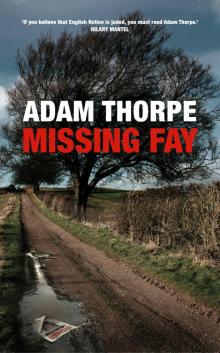 Missing Fay
Missing Fay Hodd
Hodd Pieces of Light
Pieces of Light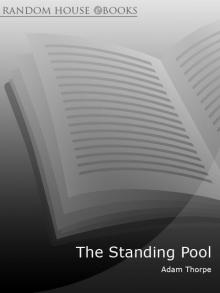 The Standing Pool
The Standing Pool Ulverton
Ulverton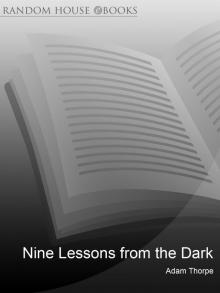 Nine Lessons From the Dark
Nine Lessons From the Dark Flight
Flight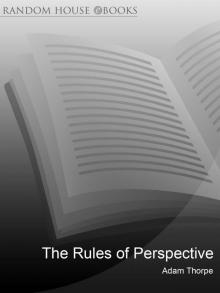 The Rules of Perspective
The Rules of Perspective From the Neanderthal
From the Neanderthal Is This the Way You Said?
Is This the Way You Said?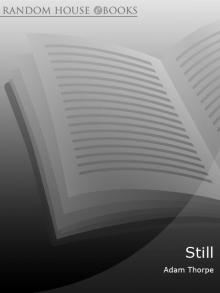 Still
Still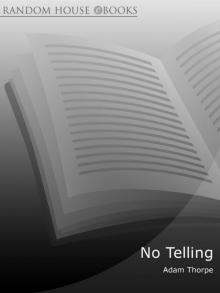 No Telling
No Telling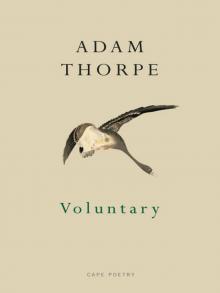 Voluntary
Voluntary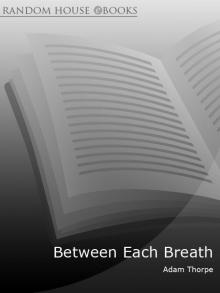 Between Each Breath
Between Each Breath